The Rediff US Special/Suleman Din

Carlos Gaviria peers into the Panavision's viewfinder and squints, pointing the bulky camera in the direction of the crowd below and in front of him. With one arm stretched outwards, it seems as if he is shooting an arrow.
He is in fact taking a shot -- a narrow and close film shot, the director of photography explains, that will make the huddle of University of Southern California students appear on screen as if they are a throng of "hundreds."
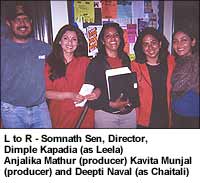 But to convey that effect, everything must be perfect. Close at hand, film director Somnath Sen oversees the crowd, scrunching them together a little more tightly, making some step forward and others to the side. A large white silk canopy billows overhead, a barrier to soften the midday sunlight. A large pole also extends over the crowd, and attached to it is a boom mike.
But to convey that effect, everything must be perfect. Close at hand, film director Somnath Sen oversees the crowd, scrunching them together a little more tightly, making some step forward and others to the side. A large white silk canopy billows overhead, a barrier to soften the midday sunlight. A large pole also extends over the crowd, and attached to it is a boom mike.
One can gauge the confusion of passer-by on their way to exams. This tent of people, lights, reflective boards, and cameras, is surreal and out of place in the middle of the USC campus. Some stop to gawk, but most keep walking -- this is Los Angeles, after all.
Gaviria asks the crowd not to look directly into his camera, but at the actor to the right who will read a speech. The scene is supposed to be a student rally, the crowd supposedly full of activists earnestly desiring an end to nuclear weapons in South Asia.
Strangely, I am at the front of the crowd, in front of the camera, standing next to a young actress. I was supposed to be an observer on the set of Leela, there to make notes, take pictures, talk to people. Instead, I have been asked to be part of the scene, even if it will be only for a split second.
"Look at him ... that's it, very good," Gaviria says, never looking up once. Sen moves away.
Stranger still, I think, is that behind me, the crowd will split, the camera will rise, and its focus will settle on the face of Dimple Kapadia.
Gaviria is ready to start the film rolling. The cries go out: "Picture's up! Quiet on the set! Lock it down! Sound speed, settle and ... action!"
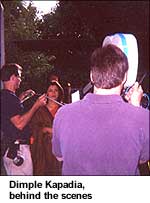 I concentrate on the speaker's mouth, as he begins a heavy anti-nuke monologue with a heavy Indian accent. I consider kismet, and how peculiar is its sense of humor; that someone like myself, who dismissed Hindi movies as silly, should be made to stand in a film scene with one of its legends.
I concentrate on the speaker's mouth, as he begins a heavy anti-nuke monologue with a heavy Indian accent. I consider kismet, and how peculiar is its sense of humor; that someone like myself, who dismissed Hindi movies as silly, should be made to stand in a film scene with one of its legends.
It was as if irony had stepped in to reinforce the cultural divide that is examined in Leela, between Indians raised in the US, separated from their roots, and those who are proud Indians, immersed in the life and blood of the homeland.
There is the character of Krishna, who prefers to be called Kris. Embodied by newcomer Amol Khatre, Kris has long distanced himself from the country of his divorced parents (Deepti Naval and Gulshan Grover).
"Sure I know about India ... Gan-dee, " Kris says gleefully in one scene, on purpose to irritate a female activist. (Irony pervades: in real life, Khatre is an American-born-and-raised desi, strongly connected to his roots, proud that he's been to India at least 12 times, yet will admit he's never dated a good 'ole desi ladki. )
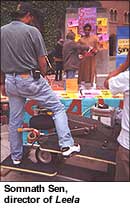 But when Leela (Kapadia), a visiting professor from India, is the new teacher for his class, Kris soon finds himself enamored with her, even though she is 20 years older than he. Leela reintroduces him to his heritage, and they fall in love.
But when Leela (Kapadia), a visiting professor from India, is the new teacher for his class, Kris soon finds himself enamored with her, even though she is 20 years older than he. Leela reintroduces him to his heritage, and they fall in love.
The obvious complications in their relationship are only compounded by other problems - Kris's tense relationship with his mother, and Leela's with her husband (Vinod Khanna). So goes the characters' journey of life and self-discovery, says producer Kavita Munjal.
Munjal is also Sen's wife. Together, the couple run Lemon Tree Films. With a $750,000 budget and backed by financiers that include Sabeer Bhatia, Leela is their first movie. It comes as no surprise to learn that like the characters in their film, the pair have come a long way to reach this point in their lives.
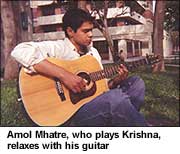 For Sen, 37, the journey began the moment he got on a plane for America. Though he loved films, he dutifully studied engineering in India, and came to the US to do his Masters in Computer Aided Design. For several years, he worked with companies like McDonnell Douglas.
For Sen, 37, the journey began the moment he got on a plane for America. Though he loved films, he dutifully studied engineering in India, and came to the US to do his Masters in Computer Aided Design. For several years, he worked with companies like McDonnell Douglas.
Once bitten, though, the film bug never left Sen, and he pursued it, gaining entry into the Masters program in Film Directing at the USC School of Cinema-Television. He then returned to India and worked in Hindi films such as Raja Hindustani and Judwaa. Having gained enough confidence and experience, he founded Lemon Tree films in Bombay, and set out to sell his ambitious project.
"A lot of the story comes from my experiences and stories that I have heard from others," Sen explains over a lunch of pasta and chicken. "Leela represents me. It is my side of the [immigrant] story."
In many ways, Sen's relationship with American-born Munjal illustrates the divide that is examined in their film, and how love can overcome it.
Munjal (who has a Masters in Communications from American University) was born in Buffalo, NY, and Sen in New Delhi. Sen readily admits that when he first came to the US, he had already made his mind up about NRIs, dismissing them as 'American Born Confused Desis.'
But after living in the US, and being with Munjal, he's sorry that he ever used the term. "I was ignorant when I used ABCD," he says.
"Kavita's experience growing up and living in the US, and her identity as an Indian, is distinct from who her mother was, and me," he continues. "There are thousands of Indians born, raised and living in North America with stories to tell, and nobody's heard them."
Sen criticizes the older generation of NRIs, commenting that in their zeal to hold on to their culture, parents often alienated their own children.
"Inside the house, there would be this old-fashioned idea of India that kids would have to deal with, and once they stepped outside, there would be the rest of the world," he says. "Even India had changed, when their parents hadn't."
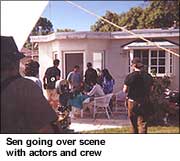 Sen hopes that Leela will bring the stories of NRIs into a new light. By bringing Bollywood to Hollywood, his goal is to bridge the cultural gap.
Sen hopes that Leela will bring the stories of NRIs into a new light. By bringing Bollywood to Hollywood, his goal is to bridge the cultural gap.
"I want to make movies that will represent our culture in a positive way... movies that all immigrant groups will identify with," he says.
"When our ancestors came, they brought the soil with them in their blood. One generation living in America can't forget that."
Our lunch over, Sen excuses himself and catches a golf cart heading back to the USC campus. I am left to think about what Sen and I have discussed.
A question lingers unanswered. Sen mentioned how Hindi films crossed the numerous linguistic and religious boundaries of India, and united people. I wonder, is Indian culture so easily wrapped up in a celluloid format? What is the pull behind Bollywood movies, anyways?
And then I remember ... I wished that I had looked over my shoulder to get a good look at Dimple.
Back to top
Tell us what you think of this feature